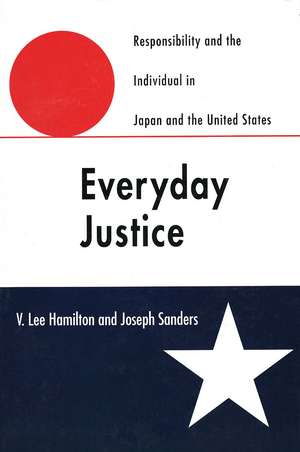Everyday Justice: Responsibility and the Individual in Japan and the United States
Autor V. Lee Hamilton, Joseph Sandersen Limba Engleză Paperback – 10 sep 1994
It is a fundamental human impulse to seek restitution or retribution when a wrong is done, yet individuals and societies assess responsibility and allocate punishment for wrongdoing in different ways. This book investigates how average citizens in the United States and Japan think about and judge various kinds of wrongdoing, how they determine who is responsible when things go wrong, and how they prefer to punish offenders.
Drawing on the results of surveys they conducted in Detroit, Michigan, and Yokohama and Kanazawa, Japan, the authors compare both individual and cultural reactions to wrongdoing. They find that decisions about justice are influenced by whether or not there seems to be a social relationship between the offender and victim: the American tendency is to see actors in isolation while the Japanese tendency is to see them in relation to others. The Japanese, who emphasize the importance of role obligations and social ties, mete out punishment with the goal of restoring the offender to the social network. Americans, who acknowledge fewer “ties that bind” and have firmer convictions that evil resides in individuals, punish wrongdoers by isolating them from the community. The authors explore the implications of “justice among friends” versus “justice towards strangers” as approaches to the righting of wrongs in modern society. Their findings will be of interest to students of social psychology, the sociology of law, and Japanese studies.
Drawing on the results of surveys they conducted in Detroit, Michigan, and Yokohama and Kanazawa, Japan, the authors compare both individual and cultural reactions to wrongdoing. They find that decisions about justice are influenced by whether or not there seems to be a social relationship between the offender and victim: the American tendency is to see actors in isolation while the Japanese tendency is to see them in relation to others. The Japanese, who emphasize the importance of role obligations and social ties, mete out punishment with the goal of restoring the offender to the social network. Americans, who acknowledge fewer “ties that bind” and have firmer convictions that evil resides in individuals, punish wrongdoers by isolating them from the community. The authors explore the implications of “justice among friends” versus “justice towards strangers” as approaches to the righting of wrongs in modern society. Their findings will be of interest to students of social psychology, the sociology of law, and Japanese studies.
Preț: 378.48 lei
Nou
Puncte Express: 568
Preț estimativ în valută:
72.42€ • 77.44$ • 60.38£
72.42€ • 77.44$ • 60.38£
Carte tipărită la comandă
Livrare economică 18 aprilie-02 mai
Preluare comenzi: 021 569.72.76
Specificații
ISBN-13: 9780300060720
ISBN-10: 0300060726
Pagini: 304
Dimensiuni: 156 x 235 x 22 mm
Greutate: 0.45 kg
Ediția:Revised
Editura: Yale University Press
Colecția Yale University Press
ISBN-10: 0300060726
Pagini: 304
Dimensiuni: 156 x 235 x 22 mm
Greutate: 0.45 kg
Ediția:Revised
Editura: Yale University Press
Colecția Yale University Press
Notă biografică
V. Lee Hamilton is professor of sociology at the University of Maryland. Joseph Sanders is professor of law at the University of Houston.






